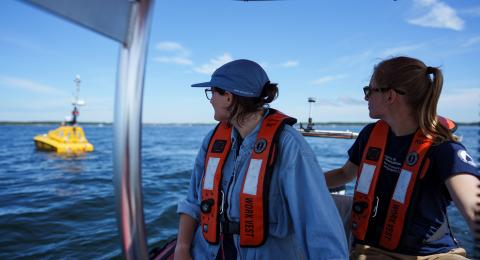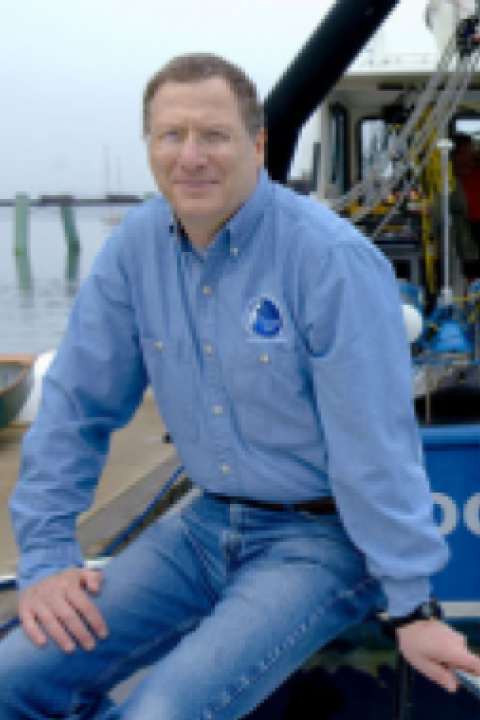The Ph.D. in Oceanography at UNH provides an exceptional opportunity to immerse yourself in marine science at a top-tier research university known for its ocean mapping prowess. You’ll collaborate with renowned faculty across disciplines while conducting research on physical, biological, chemical, and geological oceanography. Access world-class facilities like the Jackson Estuarine Laboratory and the Coastal Marine Laboratory, as well as vessels for at-sea experiences in a university that recently launched the Atlantic Marine Energy Center. With a focus on coastal, estuarine, and deep-ocean processes, our program prepares you for impactful careers in ocean-related fields.
WHY PURSUE A PH.D. IN OCEANOGRAPHY AT UNH?
Offering outstanding facilities along the New Hampshire coast and beyond, UNH is the perfect location to immerse yourself in marine science. You’ll work closely with a diverse faculty while conducting research on ocean processes in broad fields of physical, biological, chemical and geological oceanography and geophysics. You’ll have the opportunity to work in oceanic settings that range from shallow nearshore and estuarine waters to the deep ocean and span all ocean basins on Earth, including the Arctic. Our interdisciplinary programs will prepare you for professional careers in ocean-related fields.
PROGRAM HIGHLIGHTS
Our areas of research include coastal and estuarine processes, sedimentation and transport, ocean modeling, ocean acidification, climate change, ocean mapping, pale oceanography and climatology, primary productivity and microbial ecology of marine systems. Our state-of-the-art marine facilities include the Jackson Estuarine Laboratory, Coastal Marine Facility (and vessels), Shoals Marine Lab on Appledore Island, and a variety of research space in the Chase Ocean Engineering Laboratory, Ocean Processes Analysis Laboratory, Earth Sciences and Biological Sciences Departments, and the Center for Coastal and Ocean Mapping, a Joint Hydrographic Center with NOAA. You’ll have hands-on exposure to coastal and ocean processes, field data collection analysis, at-sea experiences, modeling and laboratory techniques.
POTENTIAL CAREER AREAS
- Academia
- Business
- Consulting firms
- Government research (NOAA/NRL/USGS/USACE)
- Research
- State regulatory agencies
Curriculum & Requirements
The Oceanography (OCE) graduate program has a diverse set of faculty, staff, and students who examine ocean processes in broad fields of physical, biological, chemical, and geological oceanography and geophysics Basic and applied research of an experimental, numerical, and analytical nature is conducted in oceanic settings that range from shallow nearshore and estuarine waters to the deep ocean and span all ocean basins on earth including the Arctic.
OCE offers programs leading to M.S. and Ph.D. degrees. These interdisciplinary programs prepare students for professional careers in ocean-relate fields. In addition, students can also pursue an ocean mapping option within the Department of Earth Sciences and carried out within the Center for Coastal and Ocean Mapping.
Research and Facilities
The oceanography graduate program within the Department of Earth Sciences and the School of Marine Science and Ocean Engineering (SMSOE) is enhanced by the ocean engineering and marine biology graduate programs, and by other departments and institutes at UNH, including the civil and mechanical engineering and biology departments; the Institute for the Study of Earth, Oceans, and Space (EOS); the Center for Coastal and Ocean Mapping (CCOM); and the Ocean Processes Laboratory (OPAL). Other related programs include the N.H. Sea Grant Program, the Center for Collaborative Science, and the Atlantic Marine Aquaculture Center, Coastal Response Research Center (CRRC), Northeast Consortium (NEC), and the Piscataqua Region Estuaries Partnership (PREP). Oceanographic laboratories at UNH include the Shoals Marine Laboratory (SML) on Appledore Island, the Coastal Marine Laboratory (CML) in Newcastle, the Jackson Estuarine Laboratory (JEL) at Adams Point on the Great Bay, and the Chase Ocean Engineering Laboratory (COEL) on the main UNH campus. Additional laboratories for the oceanography faculty are located on campus in James, Morse, Rudman, and Spaulding Halls. The SMSOE operates a marine support facility and two UNH research vessels moored in Portsmouth Harbor at the UNH pier, the R/V Gulf Challenger and the R/V Gulf Surveyor, as well as a number of small boats. The SMSOE also supports the UNH Diving Program and oversees a shared use Instrumentation Pool for student and faculty use.
Admission Requirements
Applicants should have completed an undergraduate major related to one of the oceanography disciplines, including biology, chemistry, engineering,geology, physics, or mathematics, or an appropriate array of science and engineering courses within their major field. Applicants are expected to have completed one year each of calculus and chemistry and two semesters of physics and/or biology. It is not necessary to have had previous coursework in oceanography.
Degree Requirements
Students plan a program of study in conjunction with a faculty guidance committee (FGC). Students entering the program without a master's degree are expected to complete a minimum of 36 credit hours. Students with an M.S. degree in oceanography or related field in physical science from UNH or another university should first demonstrate (through accredited transcript or the qualifying examination) acceptable mastery in the basic core areas. Those deficient in any discipline will be required to complete the respective course.
All students must complete all four core oceanography courses, and at least one course from each of the following categories: methods, ethics/policy/law, and seminar. Please see below for a list of courses that meet these specifications (other courses may qualify and should be approved by the FGC). Additional credit hours are determined by the FGC (typically 15 credit hours). Foreign language requirement is determined by the FGC. Students must complete a Coursework Approval Form, which summarizes all courses to be taken, and obtain signatures from their adviser, committee members, and the OCE program coordinator once the coursework is completed.
Students wishing to be admitted to doctoral candidacy will undergo a qualifying examination by the guidance committee designed to test the student’s in-depth knowledge in their major field and their ability to conduct independent and original research in oceanography. Qualifying students will present to the guidance committee a research proposal in which the soundness, originality, and feasibility of the investigation are clearly stated, and which when approved based on a proposal examination by the committee, will form the basis for the doctoral dissertation.
Students are advanced to candidacy after successfully completing the comprehensive exam, proposal exam, and all coursework required by the guidance committee. Students must complete a dissertation, present their results at a public seminar, and pass an oral examination by the thesis committee.
Although not a strict requirement, all graduate students are encouraged to obtain teaching experience, preferably as a teaching assistant.
All students are required to spend time in the field, even if their research project and interests are primarily based on analytical research, modeling studies, or laboratory experiments. The field requirement could include extended time at sea onboard one of the UNH, UNOLS, NOAA, or similar oceanographic research vessels, or include field experiments at locations in New Hampshire, the U.S., or around the globe, and includes possible nearshore and estuarine studies, Antarctic expeditions, or other land-based studies related to oceanography. Successful completion of the field requirement will be determined by the guidance committee.
| Code | Title | Credits |
|---|---|---|
| Core Required Oceanography Courses | ||
| BIOL 855 | Biological Oceanography | 4 |
| ESCI 852 | Chemical Oceanography | 3 |
| ESCI 858 | Introduction to Physical Oceanography | 3 |
| ESCI 859 | Geological Oceanography | 4 |
| Code | Title | Credits |
|---|---|---|
| Methods Courses | ||
| Select from one from the following: | ||
CHEM 862 | Advanced Chemical Analysis Instrumentation | |
ESCI 801 | Quantitative Methods in Earth Sciences | |
ESCI 820 | Ocean Measurements Lab | |
ESCI 871 | Positioning for Ocean Mapping | |
ESCI 864 | Spectral Analysis of Geophysical Time Series Data | |
ESCI 874 | Integrated Seabed Mapping Systems | |
ESCI 875 | Advanced Topics in Ocean Mapping | |
ESCI 972 | Hydrographic Field Course | |
ESCI 996 | Advanced Topics (Ocean Modelling) | |
IAM 940 | Asymptotic and Perturbation Methods | |
ME 807 | Analytical Fluid Dynamics | |
MATH 835 | Statistical Methods for Research | |
MATH 839 | Applied Regression Analysis | |
MATH 845 | Foundations of Applied Mathematics I | |
MATH 853 | Introduction to Numerical Methods | |
| Code | Title | Credits |
|---|---|---|
| Ethics, Policy, and Law Courses | ||
| Select from one from the following: | ||
ECON 908 | Environmental Economics: Theory and Policy | |
MARI 805 | Introduction to Coastal and Marine Policy: Understanding US Ocean, Coastal, and Great Lakes Policy | |
NR 820 | International Environmental Politics and Policies for the 21st Century | |
NR 824 | Resolving Environmental Conflicts | |
GRAD 930 | Ethics in Research and Scholarship | |
| Code | Title | Credits |
|---|---|---|
| Seminar and Proposal Development Courses | ||
| Select from one from the following: | ||
OE 990 | Ocean Seminars I | |
OE 991 | Ocean Seminars II | |
ESCI 997 | Seminar in Earth Sciences | |
ESCI 998 | Proposal Development | |
BIOL 901 | Introductory Graduate Seminar | |
| Code | Title | Credits |
|---|---|---|
| Other Relevant Graduate Courses | ||
| Select from the following: | ||
BIOL 828 | Marine Bioacoustics | |
BIOL 873 | Physiology of Fishes | |
CEE 822 | Introduction to Marine Pollution and Control | |
ESCI 834 | Global Geophysics | |
ESCI 841 | Geochemistry | |
ESCI 845 | Isotope Geochemistry | |
ESCI 847 | Aqueous Geochemistry | |
ESCI 849 | Ocean Biogeochemistry | |
ESCI 854 | Sedimentology | |
ESCI 856 | Geotectonics | |
ESCI 860 | Paleoceanography | |
ESCI 862 | Glacial Geology | |
ESCI 865 | Paleoclimatology | |
ESCI 896 | Topics (Nearshore Processes) | |
ESCI 995 | Advanced Topics (Geophysical Fluid Mechanics) | |
ESCI 996 | Advanced Topics (Nearshore Hydrodynamics) | |
ME 807 | Analytical Fluid Dynamics | |
ME 812 | Waves in Fluids | |
OE 853 | Ocean Hydrodynamics | |
NR 844 | Biogeochemistry (or ESCI 896 Topics/Biogeochemistry) | |
OE 854 | Ocean Waves and Tides | |
OE 857 | Coastal Engineering and Processes | |
OE 865 | Underwater Acoustics | |
OE 995 | Graduate Special Topics (Coastal Sediment Transport) | |
ZOOL 810 | Sharks and Bony Fishes | |
Program Learning Outcomes
Students graduating with a Ph.D. in Oceanography should achieve the following learning outcomes:
Core Knowledge
- Demonstrate a foundation of knowledge in all 4 of the main branches of oceanography: Geological, Biological, Physical, or Chemical.
- Geological Oceanography: An understanding marine geology and geophysics, including major geological features and history of the world’s oceans, processes of the ocean floor, composition and structure of the Earth, plate tectonic theory, marine sedimentology, and paleoceanography.
- Biological Oceanography: An understanding of marine ecosystems, primary and secondary productivity, trophodynamics, plankton diversity, zooplankton ecology, global ocean dynamics, and the physical and chemical processes that govern nutrient and light availability, the concept of food webs, role of microbes, and fisheries and anthropogenic interactions with fish stocks.
- Physical Oceanography: An understanding of the physics of the ocean, including general wind-driven and thermohaline circulation, geostrophic flow, upwelling, waves and tides, continental and nearshore processes. the effect of the earth’s rotation on large scale global ocean circulation, and instrumentation and methods used in obtaining observations.
- Chemical Oceanography: An understanding of the physical and biogeochemical process that determine the composition of seawater, including biological effects on chemistry, ocean nutrient cycles, air-sea gas exchange, radiogenic and stable isotopes as tracers of ocean properties, sediment and trace metal chemistry.
- Demonstrate basic knowledge of how the processes within the main branches of oceanography interact with each other.
- Demonstrate specialized knowledge of a field within oceanography sufficient to conduct and lead substantive independent research.
Research Methods and Analysis
- Identify and demonstrate knowledge of a range of qualitative and quantitative methodologies typically used in oceanographic research and critically evaluate research that uses these methods.
- Discover and critically read published research articles in oceanographic and related fields of the Earth Sciences, mathematics, statistics, physics, chemistry, and biology.
- Frame empirical research and/or theory guided by prior knowledge.
- Implement rigorous theoretical, numerical, field, or laboratory studies using appropriate methods, measurements, and/or techniques.
- Critically evaluate and systematically analyze data to reach appropriate findings and interpretations.
Research Independence
- Develop and implement independent research projects that meet high standards of theoretical and methodological rigor.
- Formulate and propose new hypotheses to test present understanding and discuss directions for future research with broad international audiences.
Scholarly Communication
- Structure a coherent argument that rigorously presents and evaluates evidence to support claims.
- Review and cogently synthesize relevant literature.
- Write at a level and in a style of English consistent with that found in leading academic journals.
- Understand and properly use styles of citing, referencing, and formatting found in leading academic journals.
- Clearly convey research findings through oral presentation supported by appropriate digital media.
- Cogently summarize research and its significance to non-specialist audiences.
Professionalism and Pedagogy
- Prepare and submit manuscripts that meet the standards of academic and research journals and respond appropriately to recommendations for revision that lead to publication.
- Be able to prepare and submit research proposals to funding agencies to secure extramural funding.
- Communicate through oral and media presentation to effectively convey knowledge to students, colleagues, and the community in academic lecture, public outreach, and national and international conference settings.
- Demonstrate collaboration, leadership and teamwork with colleagues, peers, and the public.
- Create a welcoming environment that is supportive, inclusive and equitable.
- Make effective contributions to university, community and professional service and be able to lead discussions with both experts and non-experts in the field.
Deadlines
Applications must be completed by the following deadlines in order to be reviewed for admission:
- Fall: Jan. 15 (for funding); April 1 (final)
- Spring: Dec. 1
- Summer: N/A
- Special: N/A
Application fee: $65
Campus: Durham
New England Regional: No
Accelerated Masters Eligible: No
New Hampshire Residents
Students claiming in-state residency must also submit a Proof of Residence Form. This form is not required to complete your application, but you will need to submit it after you are offered admission, or you will not be able to register for classes.
Transcripts
If you attended UNH or Granite State College (GSC) after September 1, 1991, and have indicated so on your online application, we will retrieve your transcript internally; this includes UNH-Durham, UNH-Manchester, UNH Non-Degree work and GSC.
If you did not attend UNH, or attended prior to September 1, 1991, then you must upload a copy (PDF) of your transcript in the application form. International transcripts must be translated into English.
If admitted, you must then request an official transcript be sent directly to our office from the Registrar's Office of each college/university attended. We accept transcripts both electronically and in hard copy:
- Electronic Transcripts: Please have your institution send the transcript directly to grad.school@unh.edu. Please note that we can only accept copies sent directly from the institution.
- Paper Transcripts: Please send hard copies of transcripts to: UNH Graduate School, Thompson Hall- 105 Main Street, Durham, NH 03824. You may request transcripts be sent to us directly from the institution or you may send them yourself as long as they remain sealed in the original university envelope.
Transcripts from all previous post-secondary institutions must be submitted and applicants must disclose any previous academic or disciplinary sanctions that resulted in their temporary or permanent separation from a previous post-secondary institution. If it is found that previous academic or disciplinary separations were not disclosed, applicants may face denial and admitted students may face dismissal from their academic program.
Letters of recommendation: 3 required
Recommendation letters submitted by relatives or friends, as well as letters older than one year, will not be accepted.
Personal Statement/Essay Questions
Prepare a brief but careful statement regarding:
- Reasons you wish to do graduate work in this field, including your immediate and long-range objectives.
- Your specific research or professional interest and experiences in this field.
Important Notes
All applicants are encouraged to contact programs directly to discuss program-specific application questions.
International Applicants
Prospective international students are required to submit TOEFL, IELTS, or equivalent examination scores. English Language Exams may be waived if English is your first language. If you wish to request a waiver, then please visit our Test Scores webpage for more information.
Explore Program Details
An applicant to the PhD program is expected to have completed one year of calculus and at least four semesters of college chemistry, physics, and/or biology; and to have an undergraduate degree or equivalent in geology, chemistry, physics, mathematics, engineering, or the biological sciences. Students lacking some background in a particular area may be admitted provided they are prepared to complete courses, without graduate credit, in which they may be deficient. The program of study a student wishes to follow and the student's undergraduate major determine the level of preparation necessary. The preparation of each student is determined before the beginning of the first semester in residence in order to plan the course of study. Each entering student is assigned an academic adviser to assist in planning a program of study.
Admission decisions will be based on:
- Alignment with and advocacy from a potential advisor. Prospective students should reach out directly to faculty with relevant research interests to ensure that the faculty member is actively recruiting students and that a relevant research project can be identified.
- Academic preparation, as documented by relevant academic courses and grades, relevant work experience, standardized test scores (if submitted), and successful completion of relevant degree programs. Students lacking some background in a particular area may be admitted provided they are prepared to complete courses, without graduate credit, in which they may be deficient.
- Scholarly potential (research, technical, oral communication, and written communication skills, acquired both from academic and non-academic settings), as documented by recommendation letters and personal statement.
- Persistence, motivation, and realistic self-appraisal, as documented by their personal statement and recommendation letters.
- Potential to capitalize on their unique experiences, perspectives or talents to contribute to the scholarly community at UNH, as documented by recommendation letters and their personal statement.















